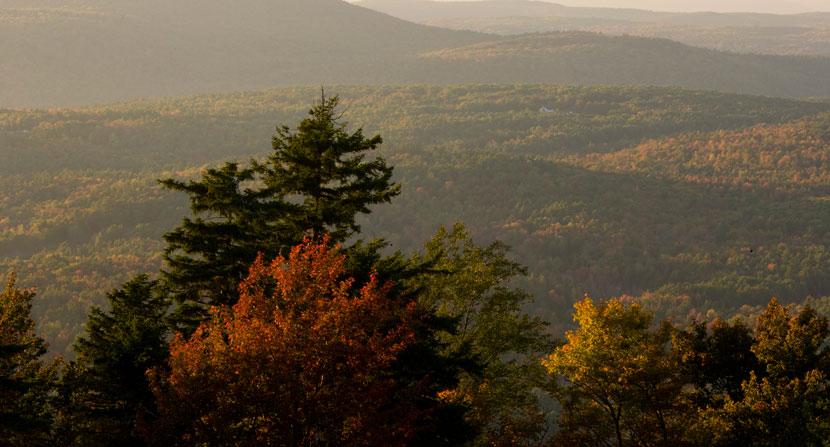- Tags:
- Advocacy,
- Working Forests

For the Forest Society, sustainable management allows forests to remain as forests. Photo by Jerry Monkman/Ecophotography
New Hampshire’s forests are very much part of the New Hampshire advantage. They provide jobs via both tourism and the forest products industry, the state’s second and fourth largest economic engines respectively. Forests provide clean air and water, habitat for wildlife, and a rich variety of recreational opportunities for residents and visitors.
Those are among the reasons the Society for the Protection of New Hampshire Forests has advocated forest protection for more than a century. It is why we continue to seek to conserve forests in the face of ongoing forest conversion. A forest that becomes a paved parking lot seldom ever returns to forest.
Most of the forestland in New Hampshire is privately owned. Rarely compensated for the natural services their forests provide, landowners can derive income from the sustainable sale of forest products, including higher valued saw logs and lower valued firewood and wood chips (biomass).
For the Forest Society, sustainable management allows forests to remain as forests. We see it as a conservation strategy—a family able to derive income from sustainable forest management of their land is less likely to turn to subdivision and development (forest conversion) to help pay property taxes, fund a college education, or other needs.
That model depends on a vibrant market. More than 65 percent of standing timber in New Hampshire is low-grade wood, which has a limited market. With the decline in paper manufacturing in New England, energy markets—using wood biomass for electricity or heat--are the only outlet for the volume of low-grade wood our forests currently produce.
That’s why the Forest Society has been in favor of two bills passed by the legislature—Senate Bill 365 that would set up three-year power contracts between electric utilities and six of the state’s biomass electric power generation plants, and Senate Bill 446 that would expand the state’s net metering program to benefit businesses that want to generate their own power, making it easier for them to sell excess power into the grid. Gov. Chris Sununu vetoed both those bills earlier this summer.
In September, the legislature has a chance to correct the Governor’s decision by overriding his vetoes. Because of the importance of the low-grade wood market to forestland owners and the forest products industry—and indeed to sustainable management of forests—we encourage lawmakers to vote to override.
There are more than 300 licensed foresters in New Hampshire who manage forestland for landowners and market wood harvested from the land. There are more than 1,200 loggers who do the hard work of harvesting and who often finance very expensive equipment to do this work. Yes, the contracts with biomass plants would be a subsidy. Those contracts would also be a worthwhile investment in the backbone of our economy.
New Hampshire has come a long way over the past 100 years in improving forest productivity, water quality, wildlife habitat and access to recreational uses on forestland. Each year New Hampshire’s forests grow more timber than is harvested. Over the past 30 years the forestry community in New Hampshire has developed voluntary guidelines for sustainable forest management practices, called Good Forestry in the Granite State, which have contributed enormously to improvements in forest management and to landowner understanding of long term sustainability of working forest land.
The Forest Society is committed to advancing the resilience of New Hampshire forests and the health of the forest products industry. The resilience of natural systems within forests support our quality of life; markets for forest products support sustainable forestry, which in turn helps make the natural systems within forests resilient. Decapitating existing energy markets for low-grade wood will not advance a century of progress in restoring the resilience of New Hampshire forests.
Jane A. Difley is the President/Forester of the Society for the Protection of New Hampshire Forests, www.forestsociety.org.
